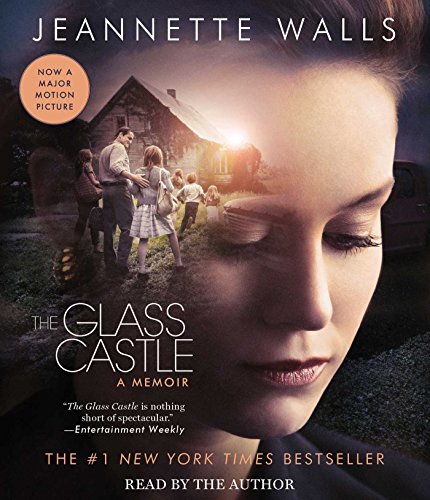
The perennially bestselling, “nothing short of spectacular” (Entertainment Weekly) memoir from one of the world’s most gifted storytellers—soon to be a major motion picture starring Oscar winner Brie Larson, Woody Harrelson, and Naomi Watts.
The Glass Castle is a remarkable memoir of resilience and redemption, and a revelatory look into a family at once deeply dysfunctional and uniquely vibrant. When sober, Jeannette’s brilliant and charismatic father captured his children’s imagination, teaching them physics, geology, and how to embrace life fearlessly. But when he drank, he was dishonest and destructive. Her mother was a free spirit who abhorred the idea of domesticity and didn’t want the responsibility of raising a family.
The Walls children learned to take care of themselves. They fed, clothed, and protected one another and eventually found their way to New York. Their parents followed them, choosing to be homeless even as their children prospered.
The Glass Castle is truly astonishing—a beloved memoir that has lived on the bestseller list for more than six years.Jeannette Walls’s father always called her “Mountain Goat” and there’s perhaps no more apt nickname for a girl who navigated a sheer and towering cliff of childhood both daily and stoically. In The Glass Castle, Walls chronicles her upbringing at the hands of eccentric, nomadic parents–Rose Mary, her frustrated-artist mother, and Rex, her brilliant, alcoholic father. To call the elder Walls’s childrearing style laissez faire would be putting it mildly. As Rose Mary and Rex, motivated by whims and paranoia, uprooted their kids time and again, the youngsters (Walls, her brother and two sisters) were left largely to their own devices. But while Rex and Rose Mary firmly believed children learned best from their own mistakes, they themselves never seemed to do so, repeating the same disastrous patterns that eventually landed them on the streets. Walls describes in fascinating detail what it was to be a child in this family, from the embarrassing (wearing shoes held together with safety pins; using markers to color her skin in an effort to camouflage holes in her pants) to the horrific (being told, after a creepy uncle pleasured himself in close proximity, that sexual assault is a crime of perception; and being pimped by her father at a bar). Though Walls has well earned the right to complain, at no point does she play the victim. In fact, Walls’ removed, nonjudgmental stance is initially startling, since many of the circumstances she describes could be categorized as abusive (and unquestioningly neglectful). But on the contrary, Walls respects her parents’ knack for making hardships feel like adventures, and her love for them–despite their overwhelming self-absorption–resonates from cover to cover. –Brangien Davis

Starving in Childhood yet Hungry for Life. Excellent read. I finished this book in 42 hours. I could not put it down. I was surprised and amazed to hear it was on the New York Times best sellers list for 2 years in a row. Amazing. Not only did this book remind me of my own childhood. It reminded me of how far i have come and how grateful i am for all of my blessings. If you ever hear of anyone complain about their finances, send them to read this book. I commend the parents in this book for having emotional issues yet NEVER ripping away…
Throwing Stones in a Glass Castle THE GLASS CASTLE is a 2005 best-selling memoir that somehow never appeared on my radar, and I have no idea why. It is in my favorite genre, the memoir by people that aren’t really famous. This book has been compared to ANGELA’S ASHES and that is a valid comparison, but I liked it much better, and I REALLY liked AA. Jeannette Walls is the second of four children born to Rex and Rose Mary Walls, who, as parents are not easily summed up in a sentence. They may be two of the most unique characters…
… and troubling story written from a child’s perspective (my favourite kind of story) This was a memorable and troubling story written from a child’s perspective (my favourite kind of story). Folks are commenting that Jeannette did not judge or condemn her parents for their miserable failings. What I suspect is simply that she was highly intelligent and had keen insight into their psychology and knew, on a deeper level than most children, they were “doing the best they could” in a sense. Only she knows what is in her heart. I got the sense she accepted and saw…